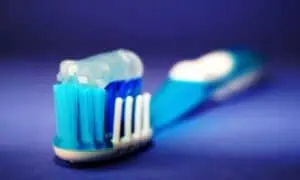
Step 1: See Your Dentist in Asheboro
First thing’s first, you should schedule an appointment with your dentist so they can take a look at how your denture fits and talk to you about any recommendations they have. Don’t try to adjust a denture on your own. You can easily damage the appliance and it can be more costly to replace.
Step 2: Get Your Denture Relined
Next, it’s important to know that dentures probably won’t last forever without any adjustments. This is because things in our mouths such as gum tissue and the jawbone can change over time and can cause a once-perfect fit to feel off and uncomfortable. This is when a reline will come into play.
Having your denture realigned can adjust the fit to match the changes that have occurred in your mouth, allowing for a proper fit once again. There are two types of relines – soft and hard.
Soft Reline – This type of relining is usually completed in your dentist’s office and is usually a quick process. Your dentist will make adjustments using a liquid polymer and allow patient feedback right in the dental chair for a perfect fit.
Hard Reline – A hard reline still requires a dental appointment and your dentist to examine the current fit. However, with this process, your dentist will take new impressions and send dentures out to a lab to be remade using the new ideal fit.
Step 3: Consider Alternatives
While dentures are a great solution to replace missing teeth, there are other options available that can provide a permanent, and often more comfortable, fit. Dental implants in Asheboro can permanently replace not only the tooth but also the tooth’s roots. This provides a more stable base and continues to stimulate the jaw bone, keeping it stronger for longer. Additionally, dental implants eliminate the need for adhesives and overnight soaking. There are many different types of dental implants available including traditional implants to replace one or two missing teeth, mini implants, as well as implant-retained dentures that permanently affix a full denture on just a few implant posts.
Living with a denture that doesn’t fit properly can be annoying and sometimes perhaps a bit painful. Don’t live with that discomfort, call your dentist in Asheboro to schedule a checkup and we’ll get you back to smiling confidently in no time.




 If it’s been a few years since you’ve seen a dentist, you may be wondering what could happen to your oral health or just what you should expect when you
If it’s been a few years since you’ve seen a dentist, you may be wondering what could happen to your oral health or just what you should expect when you 

 We’re nearing the two-year mark since the beginning of the COVID-19 pandemic, and while the virus attacks the respiratory system, it can also affect other areas throughout the body, including the mouth. Those who have contracted COVID-19 and recovered may have little to no lingering side effects. However, others may have what’s called “long-COVID” and continue to have lasting symptoms. In fact, according to your
We’re nearing the two-year mark since the beginning of the COVID-19 pandemic, and while the virus attacks the respiratory system, it can also affect other areas throughout the body, including the mouth. Those who have contracted COVID-19 and recovered may have little to no lingering side effects. However, others may have what’s called “long-COVID” and continue to have lasting symptoms. In fact, according to your 






